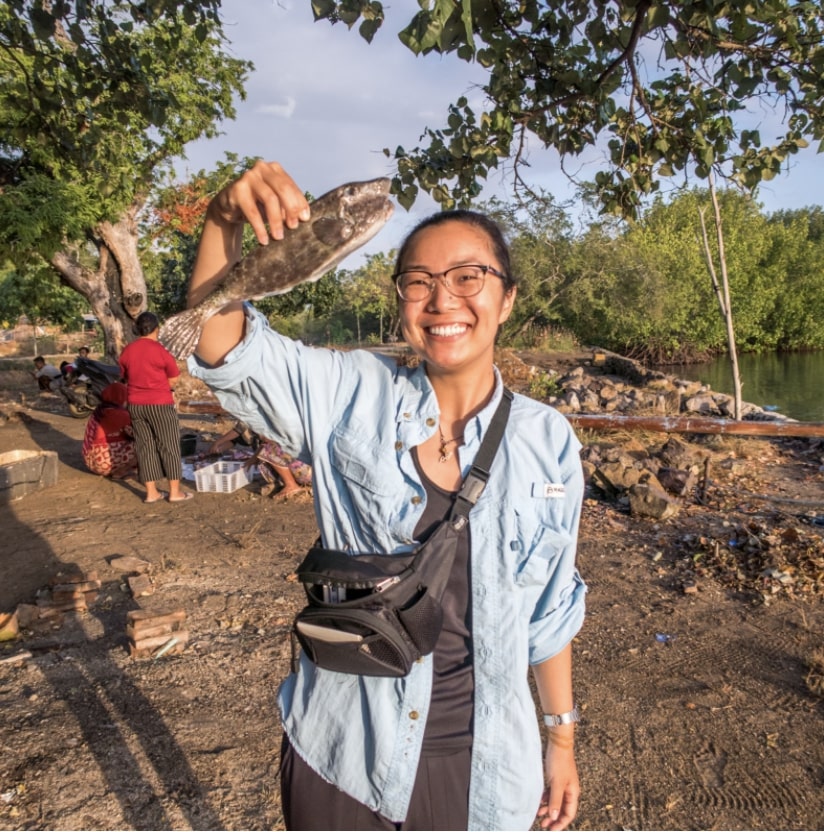Fourth-year biological and environmental sciences doctoral candidate Elaine Shen in the field with a fish. PHOTO CREDIT: Sarah O’Sullivan
In celebration of International Women’s Day on March 8, I sat down and interviewed three women from the University of Rhode Island to highlight how they became STEM researchers and what inspires them to continue their work.
Hannah MacDonald, a graduate student working on her Masters of Environmental Science and Management (MESM) degree on the environmental communication track, has been interested in ocean science and nature preservation for as long as she can remember.
Growing up in Michigan, MacDonald obtained her scuba diving certification in a national marine sanctuary near her home at the age of 14, where she found a deep love for marine life.
After graduating from Michigan State University with a bachelor’s degree in earth science, MacDonald worked for the National Marine Sanctuaries headquarters in Washington, D.C.
“Ever since then, it’s transformed my thinking from science education to science communication,” MacDonald said.
After working in Washington as a distance learning educator in ocean exploration and virtual reality, MacDonald was ready for a change.
“I realized that I liked talking to adults and working on projects that influence adults — stakeholder engagement work,” she said.
Her next step was to move to Rhode Island, the Ocean State. For two years, MacDonald worked at the Inner Space Center at the Graduate School of Oceanography running educational programming.
One day, while talking with other staff members, MacDonald learned about the Metcalf Institute, which provides education, training and resources to journalists, scientists and science communicators. This is also where she learned about the environmental communication track offered by the URI Graduate School.
What MacDonald likes most about this field is being able to work with people and “the way that people understand things differently and have different perspectives.”
In the future, MacDonald said that she wants to stay in New England and complete “some kind of people-oriented marine resource work.” For example, she is interested in being a resource manager or acting as a liaison between fishermen and scientists.
“I want to take all of the skills that I’ve learned in science communication training and experiences and apply them to the real world,” MacDonald said.
She describes this work as being “feet wet, doing real things with science communication.”
Similar to MacDonald, Elaine Shen didn’t have direct access to the ocean growing up and had to utilize other routes to get to where she is today. Shen is a fourth-year doctoral candidate in the biological and environmental sciences program specializing in ecology and ecosystem sciences. She started her journey in the field during her undergraduate years when she majored in marine biology and conducted research related to marine biology.
A pivotal moment in her career was when she attended a bioinformatics and metagenomics workshop. As an undergraduate at Rice University in Texas, this was a valuable experience because Shen was able to network with professionals and graduate students in the field.
After attending the workshop, she collaborated with one of the graduate students that was there. The two of them were invited to conduct research in Panama where they were able to study biodiversity and this work was included in her senior thesis for her undergraduate degree.
“Networking is just talking to people,” Shen said. “You never know what impressions you’re going to leave with someone.”
Carolyn Decker is a URI alumnus who received a Master of Science in biological and environmental sciences with a specialization in ecology and ecosystem sciences. She also completed her graduate certificate in science writing and rhetoric during her time at the University.
“I do feel like I fall into the category of people who come into science from a non-traditional path,” Decker said.
Decker received her undergraduate degree at Wheaton College, a liberal arts college in Massachusetts.
Soon after completing her bachelor’s degree, Decker received a Watson Fellowship to go abroad and pursue a project about nature conservation and creative writing in different parts of the world. This allowed her to meet scientists and writers working towards conservation.
After coming back to the United States, she was open to doing anything related to the environment. She broke into environmental consulting but felt like she reached a point where she couldn’t really advance in the field, and she wanted to continue to grow as a scientist.
“I have a very clear memory of being six or seven years old and a huge snapping turtle came into my yard and was so fascinated with what she was doing,” Decker said.
This was what piqued her curiosity in science and her desire to delve deeper into the research side.
“The more that I learned about ecology, I saw how little we do know and how much more there is to learn,” Decker said.
Going forward, Decker hopes to continue her work in the creative arts and writing with the technical sciences. This goal would allow her to operate retreats and allow people to meet one another, network and work towards a common scientific goal at the same time.
Getting involved in science can seem daunting at first, but by following their passions, these women are making strides in the STEM community for the future of conservation.
“My earliest memory is wanting to be a marine biologist, since kindergarten,” Shen said. “But, I will say that this hasn’t been a consistent dream, and you don’t have to know exactly what you want to do from a very young age in order to be successful at the job.”

